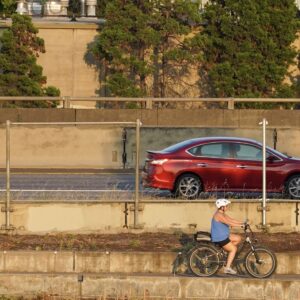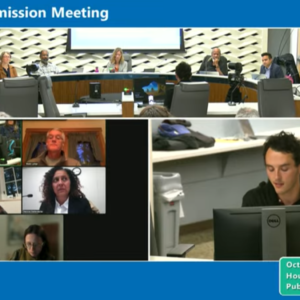Portland-area U.S. House Representative Earl Blumenauer will unveil his “Commuter Relief Act” at a luncheon on May 18th. The legislation would make it easier to bike and take transit to work by improving existing federal policy that prioritizes driving alone over other modes.
Calling it a “matter of equity,” Blumenauer has worked for years to make it easier for employers to encourage non single-occupancy motor-vehicle commutes. Back in October 2008, his bike commuter tax benefit finally passed. It was a good first step; but it is anemic (offering just $20 a month for bicycling) and unnecessarily opaque (read a FAQ about it here).
Now, Blumenauer is working on a host of new provisions that would reward existing bike commuters and, hopefully, encourage others to give it a try.
“For years, federal transportation policies have indirectly incentivized driving alone to work. It doesn’t make sense to prioritize one commuting method over another.”
Citing a “working public that is looking for options” amid high gas prices and the current economic climate, Blumenauer’s Commuter Relief Act (a.k.a. “Green Routes to Work Act”) has five key provisions (taken from a one-pager supplied by his office):
- Transit Equity: Sets the uniform dollar cap for all transportation fringe benefits to $200 a month.
- Self Employed Extension of Transportation Fringe Benefits: Allows individuals who are self-employed to receive transit fringe benefits for commuting done for work purposes.
- Parking Cashout: Requires employers who offer a parking transportation fringe benefit to employees to also offer employees the option to take cash instead, reducing the incentive to drive instead of take alternative transportation.
- Vanpool Credit: Creates a 10% tax credit for expenditures on vanpool vehicles and services, which will provide an incentive for employers and employees to share their commutes.
- MultiModal Transportation: Allows individuals to combine their bike benefit with other transportation fringe benefits as long as they fall under the $200 cap (for example, individuals can use the $20 bike credit and still collect up to $180 of their public transit fringe benefit). This section recognizes that people rarely use one type of transportation only to commute: they use a combination of modes depending on the weather, their needs for the day and other factors.
We’ve seen many of these provisions before. Back in July 2009, Blumenauer introduced a similar bill.
While his approach may have undergone subtle variations in recent years, Blumenauer’s reason for working on this legislation remains the same. “For years, federal transportation policies have indirectly incentivized driving alone to work,” says a on-pager on the bill, “It doesn’t make sense to prioritize one commuting method over another.”
An important note about this legislation is that it’s “revenue neutral,” meaning it won’t cost the government any money to implement. It achieves this reducing the overall transit and parking cap from $230 to $200 a month.
Blumenauer will publicly unveil this legislation at the Governor Hotel in downtown Portland at a luncheon on May 18th. Joining the congressman at the event will be Metro Councilor Rex Burkholder, Portland Mayor Sam Adams, and Executive Director of the Portland Development Commission Patrick Quinton.








Thanks for reading.
BikePortland has served this community with independent community journalism since 2005. We rely on subscriptions from readers like you to survive. Your financial support is vital in keeping this valuable resource alive and well.
Please subscribe today to strengthen and expand our work.
This bill sounds sweet. Makes me wish my employers were in the United States…
I’m generally opposed to using the tax code to give behavioral incentives (mostly ’cause it ends up being the rich with lobbyists that benefit the most…) but this is pretty cool. Hopefully the next time the Dems are in power it’ll actually pass.
Don’t the Dems control 2/3 of the government or ?
Yup, just not the one that Earl belongs to.
How about we stop spending tax dollars to subsidize car or bike commuting and parking. Since bike commuting and parking is cheap in the first place.
He might have a better chance by just proposing to eliminate any and all parking incentives. He would be “cutting the deficit” and helping cycling at the same time.
Yeah Earl!
telecommuting is even more efficient, and walking from home to office is a close second. Eliminate all subsidies for all forms of commuting.
My telecommuting is tax-deductible, and therefore, subsidized…
I’m glad that he’s trying to bring equity to the Qualified Transportation Fringe Benefit section of the code by trying to make the bike commuting benefit combinable with the other qualified transpo fringes. This whole thing looks good from this payroll professional.
These benefits are basically useless since you have to go through your employer to receive the benefit.
I work for one of Oregon’s large high-tech employers and we have no commute-related benefits, despite having a relatively poor commute from Portland.
Earl, if you want to help then please make it so I can deduct these expenses directly on my taxes; irrespective of my employer’s inaction.
I’m in the “eliminate them all” camp. If we’re really about a “free market” and “small government” and everyone “paying their fair share,” we shouldn’t be subsidizing any form of transportation with the possible exception of keeping some options open to low-income workers. That includes the cost of keeping oil flowing out of the Middle East, as far as I’m concerned. When gas goes to $15/gallon, these Lloyd Center “economic interests” will be putting in the bike lanes themselves! As it is, their considerable political weight comes as a direct result of our subsidies. Eliminate them all, and then let’s talk about appropriate transportation policy.
‘If we’re really about a “free market” and “small government” and everyone “paying their fair share’
How does a “free market” lead to everyone “paying their fair share”. Or to parapharase Galbraith…the problem with free markets is that someone always wins (and begins to control the market).